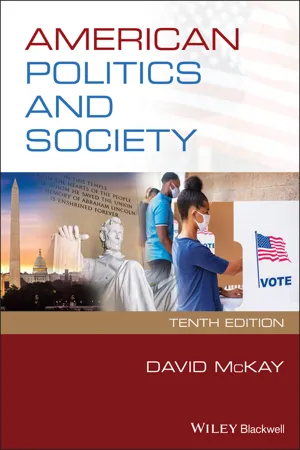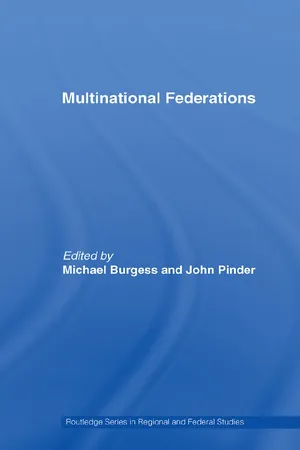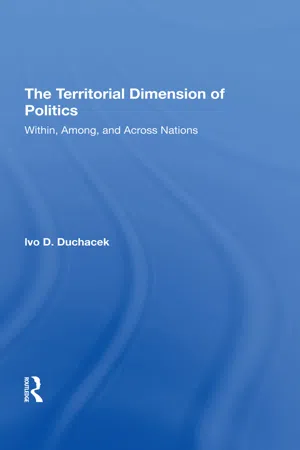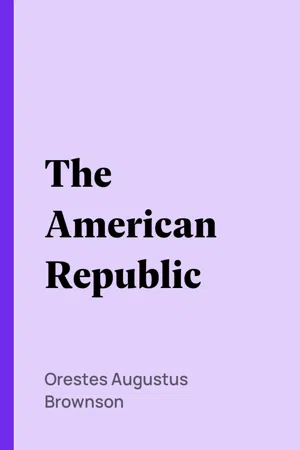Politics & International Relations
Confederation
Confederation refers to a political system in which independent states or regions form a union while retaining their sovereignty. This union typically involves a central governing body with limited powers, leaving most authority to the individual states. Confederations are characterized by a decentralized structure and a focus on cooperation among member entities.
Written by Perlego with AI-assistance
Related key terms
1 of 5
4 Key excerpts on "Confederation"
- eBook - ePub
- David McKay(Author)
- 2021(Publication Date)
- Wiley-Blackwell(Publisher)
Under confederal arrangements sovereignty is vested in the state or regional governments, whose agreement is required in order to sanction action by the central government. The US Articles of Confederation and the Confederacy during the Civil War operated roughly in this way, and such organizations as the United Nations and NATO approximate to confederal systems. The defining feature of federalism is that of dual sovereignty or a sharing of powers between state and central governments. Under federalism each level of government is assumed to be supreme in at least one policy area. Typically the federal government would have responsibility for defence and foreign affairs, while the states would control such things as education and law and order. The three models represented in Figure 4.1 are, of course, idealized types. In reality most political systems, while labelled unitary or federal, actually share features of both. Figure 4.1 Constitutional relations in the three basic forms of government. American federal arrangements are among the world’s oldest, and the US example is often held up as a model of what federalism should look like. At the same time, it was not so long ago that many Europeans viewed US federalism with a combination of distant interest and condescension. A constitutional division of powers between centre and periphery might, so the argument ran, suit such large and diverse countries as the United States, but they were clearly inappropriate for relatively homogeneous countries like Britain and France, with their centralized metropolitan political cultures based on dominant capital cities. For social reformers, federalism was viewed with particular scepticism - eBook - ePub
- Michael Burgess, John Pinder(Authors)
- 2007(Publication Date)
- Routledge(Publisher)
Since federation involves a combination of elements of ‘self-rule’ for the constituent units for certain purposes and ‘shared rule’ through common institutions for certain other purposes, it will be the contention of this chapter that the form which each of these two aspects takes in an individual multinational federation has a crucial bearing on its relative effectiveness. Thus, the mere adoption of federation or not does not give the full picture. The organization of ‘self-rule’ for the constituent units may take a variety of forms, and the particular form has a direct effect upon the effective operation of a multinational federation. Similarly, ‘shared rule’ in the common institutions may take a variety of institutional forms and processes, and these too significantly affect the operation of a multinational federation.Federalism, federal political systems, federations and multinationalism
To provide a definitional context for the comparison of multinational federations, I start with definitions of ‘federalism’, ‘federal political systems’, ‘federations’ and ‘nationalism’. I have elsewhere previously distinguished the terms ‘federalism’, ‘federal political system’ and ‘federation’ (Watts 1998:119–22; 1999:6–14). Following the lead of Preston King (1982) I treat ‘federalism’ as a normative and philosophical concept involving the advocacy of federal principles, i.e. the combining of joint action and self-government. The terms ‘federal political system’ and ‘federation’ are by contrast descriptive terms, and here I follow a distinction made by Daniel Elazar (1987) and use the former term to refer to the broad genus that encompasses a variety of species including constitutionally decentralized unions, federations, Confederations, federacies, associated states, condominiums, leagues, joint functional authorities. And I would add to Elazar’s list hybrids of these species such as the confederal-federal EU (Watts 1999:9) which Murray Forsyth in Chapter 9 has described as a ‘Federal Union’.The term ‘federation’ in this threefold distinction refers to a specific species within the broad genus of ‘federal political systems’. A ‘federation’ is a compound polity combining constituent units of government and a general government, each possessing specific powers delegated to it by the citizens through a constitution. As the Supreme Court of Canada has put it, it is a form of government in which territorial self-government is distributed in such a way that citizens ‘participate concurrently in different collectivities’ (2SCR217 (1998), para. 66). A number of authors, most notably Elazar (1987), have emphasized as distinctive the covenantal character of federations with the authority of each government derived from the constitution rather than from another government. In a federation each government is empowered to deal directly with its citizens in the exercise of a significant portion of its legislative, administrative and taxing powers, and a significant component of each government is directly elected by its citizens. Common characteristics of federations therefore are: the existence of two or more orders of government each acting directly on their citizens; a formal constitutional distribution of legislative and executive authority and allocation of revenue resources to the different orders of government; a supreme written constitution not unilaterally amendable by either order of government and requiring a measure of consent from each order; an umpire, usually in the form of courts, to adjudicate disputes between governments; processes and institutions to facilitate intergovernmental collaboration for those areas where governmental responsibilities are shared or inevitably overlap; and provision for the designated representation of distinct regional views within the federal policy-making institutions, usually including some form of federal second legislative chamber. While these basic features are generally common to federations, federations do vary widely, however, in the number and character of their constituent units, in the form and scope of the distribution of legislative and executive powers and financial resources, in the specific processes for constitutional amendment and flexibility, in the scope and role of the courts (or in the case of Switzerland of referendums) as constitutional umpires, in the character of their intergovernmental relations, and in the structure and processes of the shared representative institutions. Indeed, the relative effectiveness of a federation may depend as much upon the particular variations of these features that it incorporates as upon the general decision to adopt federation as a form of government. Since the focus of this book is primarily upon multinational federations, the analysis in this chapter will be limited to federations rather than to other forms of federal political systems which may also be multinational. - eBook - ePub
The Territorial Dimension Of Politics
Within, Among, And Across Nations
- Ivo D. Duchacek, Helena Duchacek(Authors)
- 2019(Publication Date)
- Routledge(Publisher)
In contrast to the preceding separate listing of the various tasks and agencies, in real life the various types of external challenges to territorial communities do not occur in isolation one from the other; they overlap. As internal politics (central and noncentral) cannot be separated from foreign and military policies, so politics in general cannot be separated from economics, technological changes, social concerns, ideological considerations, and environmental imperatives. More often than not a confederal association has to be a multipurpose one to better serve its central purpose.In the eighteenth century, for example, Article 2 of the Articles of Confederation listed “common defence” as the first reason for the confederal union but also included, as reasons two and three, “the security of their liberties” and “mutual and general welfare”—quite modern terminology. Similarly, confederal associations of sovereign states today try to enhance their economic, social, or cultural cooperation by stressing external military or ideological challenges. European unity has sometimes been promoted by asserting its uniqueness vis-à-vis the two non-European superpowers, the United States and Soviet Union. In the late 1950s, a prominent French writer, François Mauriac, argued that Europe need not fear that which divides Russia from the United States but rather that which these two giants have in common.Whereas economic and functional associations strengthen themselves by dealing also with external cultural, ideological, or military challenges, obversely, military alliances try to strengthen their mutual bonds by a coordinated promotion of economic and cultural cooperation. Article 2 of the North Atlantic Treaty, for example, pledges that parties will “seek to eliminate conflict in their international economic policies and will encourage economic collaboration between any or all of them” and “promote conditions of stability and well-being.” - eBook - ePub
The American Republic
Its Constitution, Tendencies, and Destiny
- Orestes Augustus Brownson(Author)
- 2000(Publication Date)
- Perlego(Publisher)
If the Anglo-American colonies, when their independence of Great Britain was achieved and acknowledged, were severally sovereign states, it has never since been in their power to unite and form a single sovereign state, or to form themselves into one indivisible sovereign nation. They could unite only by mutual agreement, which gives only a Confederation, in which each retains its own sovereignty, as two individuals, however closely united, retain each his own individuality. No sovereignty is of conventional origin, and none can emerge from the convention that did not enter it. Either the states are one sovereign people or they are not. If they are not, it is undoubtedly a great disadvantage; but a disadvantage that must be accepted, and submitted to without a murmur.Whether the United States are one sovereign people or only a Confederation is a question of very grave importance. If they are only a Confederation of states—and if they ever were severally sovereign states, only a Confederation they certainly are—state secession is an inalienable right, and the government has had no right to make war on the secessionists as rebels, or to treat them, when their military power is broken, as traitors, or disloyal persons. The honor of the government, and of the people who have sustained it, is then deeply compromised.What then is the fact? Are the United States politically one people, nation, state, or republic, or are they simply independent sovereign states united in close and intimate alliance, league, or federation, by a mutual pact or agreement? Were the people of the United States who ordained and established the written constitution one people, or were they not? If they were not before ordaining and establishing the government, they are not now; for the adoption of the constitution did not and could not make them one. Whether they are one or many is then simply a question of fact, to be decided by the facts in the case, not by the theories of American statesmen, the opinion of jurists, or even by constitutional law itself. The old Articles of Confederation and the later Constitution can serve here only as historical documents. Constitutions and laws presuppose the existence of a national sovereign from which they emanate, and that ordains them, for they are the formal expression of a sovereign will. The nation must exist as an historical fact, prior to the possession or exercise of sovereign power, prior to the existence of written Constitutions and laws of any kind, and its existence must be established before they can be recognized as having any legal force or vitality.
Index pages curate the most relevant extracts from our library of academic textbooks. They’ve been created using an in-house natural language model (NLM), each adding context and meaning to key research topics.



